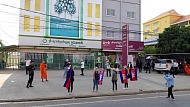Microfinance/Debt
Briefing | Worked to Debt: Over-Indebtedness in Cambodia's Garment Sector
30 June 2020
Tens of thousands of garment workers in Cambodia will struggle to repay microfinance debts during work stoppages and factory suspensions caused by COVID-19, creating a mounting human rights crisis as they struggle to feed their families and hold onto their land under immense pressure from microfinance institutions (MFIs). Without immediate debt relief, many of these workers will resort to selling their land or their homes, eating less food or taking out even more loans to repay their debts.
In Worked to Debt, a joint briefing paper between the Cambodian Alliance of Trade Unions (CATU), the Center for Alliance of Labor and Human Rights (CENTRAL) and the Cambodian League for the Promotion and Defense of Human Rights (LICADHO), researchers surveyed more than 150 workers – most of them women – from three factories in Phnom Penh and Kampong Chhnang to investigate how workers were coping with their debts as hundreds of factories suspended operations as a result of the global pandemic.

10 May 2020
Six members of Cambodian youth group Khmer Thavrak including human rights activist Hun Vannak were arrested in Battambang last night while returning from a peaceful protest calling on banks and microfinance institutions (MFIs) to suspend loan repayments amid the economic crisis caused by the global COVID-19 pandemic. Five monks who joined the protest were also threatened with expulsion from their pagodas unless they thumb-printed an agreement pledging to stop their activism on behalf of Cambodian borrowers.
Briefing | Driven Out: One Village's Experience with MFIs and Cross-Border Migration
5 May 2020
“The benefits of MFIs are short, but the fear is long.”
Throughout Cambodia’s northwest, widespread microfinance debt is pushing families from their homes to find work across the Thai border. In this briefing paper “Driven Out: A study on MFIs and Cross-Border Migration”, LICADHO focuses on a single village in Banteay Meanchey province to dig deeper into the link between microfinance debt and migration in Cambodia’s borderlands. Through interviews conducted with remaining family members from 30 households, LICADHO’s researchers found that over-indebtedness to microfinance institutions (MFIs) was the primary motivating factor for migration in the village.
“Far too many families have had to leave their homes and their country to repay microfinance institutions,” said LICADHO director Naly Pilorge. “Now, with tens of thousands of former migrant workers unable to work in Thailand due to COVID-19, the government and MFIs must help these borrowers by suspending repayments and returning land titles.”

5 May 2020
For many families in Cambodia’s northwest, migrant work is the only way they can manage their rising microfinance debts. In this video, men and women from the Thai border share their fears of what will happen when they can no longer pay back their loans.
Statement | Suspend MFI Debts and Return Land Titles Amid Covid-19 Pandemic
27 April 2020
The suffering of millions of Cambodians who are facing economic hardship due to the COVID-19 pandemic is being amplified by the country’s ongoing over-indebtedness crisis, stemming from more than $10 billion in loans from aggressive microfinance institutions (MFIs). More than two and a half million Cambodians currently hold microloans, with an average loan of more than $3,800 – the largest amount in the world. This puts millions of Cambodians’ livelihoods, health and land tenure security at risk.
The government must ensure that MFIs immediately suspend all loan repayments as well as interest accrual on loans for at least three months and return the millions of land titles currently held as collateral by MFIs to their owners. These actions are necessary to ensure that people are able to survive this crisis without risking their health or homes, and are able to avoid further risky loans that could lead to bonded labour, human trafficking and other human rights abuses.

19 August 2019
Farmers often take microfinance debt, but then struggle to repay it due to falling crop prices or crop failures. Selling their land is sometimes the only way they can repay their microfinance loans.
Video | Debt-driven Migration
13 August 2019
Many Cambodians have had family members migrate to pay off microfinance debts. A report by the IOM in 2016 found that more than 40% of Cambodians who migrated abroad did so to pay debts. End debt-driven migration.
Video | Vicious Cycle of Debt
8 August 2019
The average size of a microloan in Cambodia is now the highest in the world. Many farmers are trapped in a cycle of debt, forced to get larger and larger loans to survive. Watch the video below to learn one man's story.
Statement | Collateral Damage: Land Loss and Abuses in Cambodia's Microfinance Sector
7 August 2019
More than 2 million Cambodians currently have a loan with a microfinance institution, or MFI. Levels of debt have skyrocketed in recent years, leading to a number of human rights abuses, including coerced land sales, child labour, debt-driven migration, and bonded labour, according to a joint report from the Cambodian League for the Promotion and Defense of Human Rights (LICADHO) and Sahmakum Teang Tnaut (STT), two Cambodian human rights NGOs.
Collateral Damage: Land Losses and Abuses in Cambodia’s Microfinance Sector details the size and scope of Cambodia’s MFI sector and seeks to highlight the human rights abuses that researchers discovered. The research spans 10 communes in 4 provinces as well as Phnom Penh and features seven detailed case studies of abuses, chosen from the 28 MFI clients who suffered human rights abuses that were interviewed by researchers.